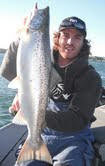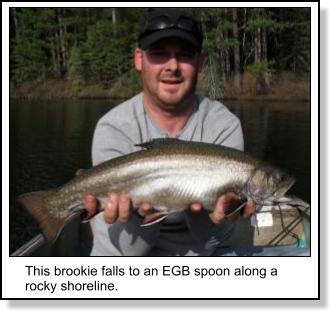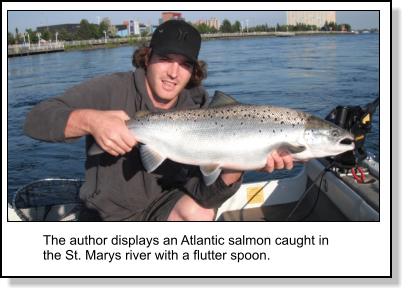|
 Spoons
– An Absolute Must For All Anglers! Spoons
– An Absolute Must For All Anglers!
 By:
Tyler Dunn
Tyler Dunn Guiding By:
Tyler Dunn
Tyler Dunn Guiding
If there is one all around lure that an angler
could get away with using throughout the entire
year and it would give them an excellent shot at
landing a fish, it would be a spoon. Pike,
walleye, salmon, bass and all trout take spoons
either by casting, trolling or jigging them. The
vibrations and flash given off from a spoon
entices some of my biggest fish throughout the
year. This spring in fact, I hooked and landed
the biggest pike of my season north of
Hornepayne on a custom taped Williams Wobler.
This spoon almost didn’t come off my line
anytime I was I pike territory over our 4 day
trip. Spoons are such a versatile tool for an
angler. You can cast and troll them in both deep
and shallow water. Burn them over top of weed
beds or slow roll them along deep, rocky
drop-offs. The following are some tips for
anyone looking to catch more fish on spoons!
 Spoons
can put into three different categories which
are casting, trolling and jigging. Some spoons
can be used for both trolling and casting while
even a few can be used for all three techniques.
The biggest difference in casting and trolling
spoons is simply the weight and the gauge of
metal the spoons are made from. Casting spoons
are thicker and trolling spoons tend to be much
thinner. An EGB is an ideal example for a great
casting spoon. It has a small and compact shape
but is heavy enough to cast with some distance.
An EGB was actually the lure that took the
biggest brook trout on our last May long weekend
at a lodge north of Elliot Lake. My cousin was
lucky enough to pull the 21” trout off a rocky
shoreline we were bombing casts along. Spoons
can put into three different categories which
are casting, trolling and jigging. Some spoons
can be used for both trolling and casting while
even a few can be used for all three techniques.
The biggest difference in casting and trolling
spoons is simply the weight and the gauge of
metal the spoons are made from. Casting spoons
are thicker and trolling spoons tend to be much
thinner. An EGB is an ideal example for a great
casting spoon. It has a small and compact shape
but is heavy enough to cast with some distance.
An EGB was actually the lure that took the
biggest brook trout on our last May long weekend
at a lodge north of Elliot Lake. My cousin was
lucky enough to pull the 21” trout off a rocky
shoreline we were bombing casts along.
Trolling spoons (flutter spoons) are almost
always a light gauge spoon with a ton of action.
Whipping these lures around with manoeuvres like
a sharp s- turn with a short speed burst often
triggers vicious strikes. These methods work
especially well in rivers where the current will
move that lure around with an unbelievable
amount of flash and dance and is something I use
regularly on the St. Mary’s river. Being so
light, casting a flutter spoon can be quite
hard. That being said, a little bit of weight
added like a few large split shots will help
with a little bit of extra distance and help
keep it down in the water while you retrieve.
Jigging spoons on the other hand can be both a
heavy gauge metal and a thin gauge metal.
Jigging with spoons is quite possibly the
easiest t way to fish. Simply drop an anchor or
use your bow mount to hold vertical or slowly
drift maintaining a vertical presentation.
Almost touch the water with the tip of your rod
and then snap the rod up. The power and length
of your snap is up to you but generally a two
foot raise is what I begin with. Since jigging
spoons have different actions due to size, shape
and weight having a variety of options is a must
especially when ice fishing. Swedish pimples are
ideal for getting down to bottom quick and
working the lower portion of the water column.
Pounding a pimple off bottom accounts for dozens
of lake trout each year for me on back lakes
found in Lake Superior Provincial Park. Another
spoon that is responsible for taking a ton of
vertical lake trout is a Williams jigging spoon
in hammered half and half (gold/silver). I like
to work this spoon in the middle part of the
water column with ripping jigs.

One thing I have learned over the years of
tossing spoons is that adding prism tape,
feathers, rattles, beads and other unique items
can be a great asset for catching fish and
saving money. Trolling spoons are especially
prone to losing the tape/colour applied by the
manufacture only after a couple hits or even
just peeling over time. Instead of discarding
these lures the original tape jobs cab be
recreated using prism tape. Another option is to
buy blank spoons and get creative with your own
colours patterns. If it doesn’t catch a fish
just re-tape a new pattern on. Another good tip
is to glue small rattles your spoons. Often in
dirty water or even on dark days a rattles seems
put a few extra fish in the boat.
Anglers can chuck spoons for pretty any sport
fish found in Ontario and have a great chance at
catching one. Spoons are always in my arsenal,
it doesn’t matter if I’m targeting spring pike,
summer lakers or salmon in the fall. Whichever
species you target, toss a spoon and there’s a
good chance you’ll get a bite!
|